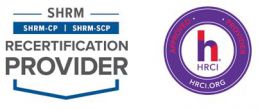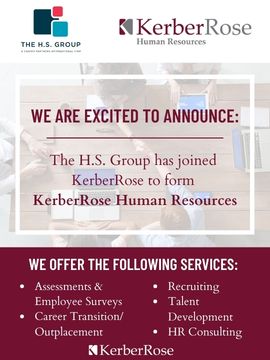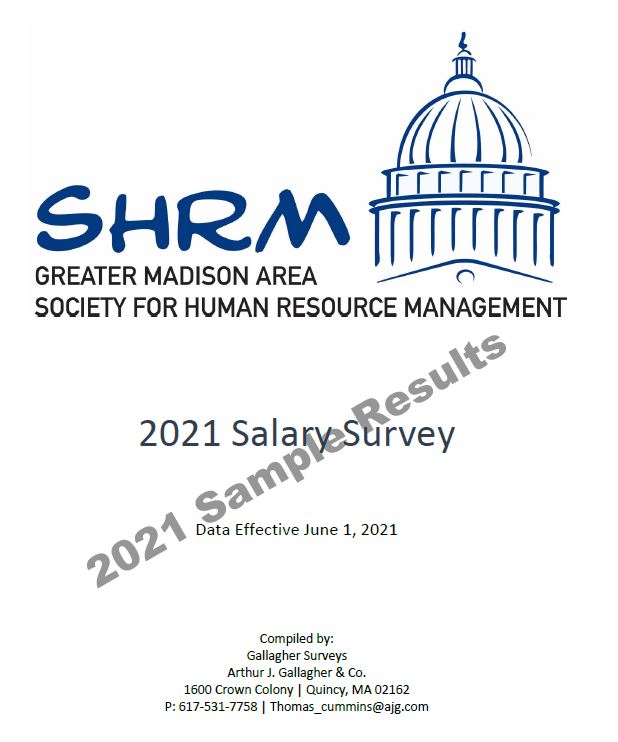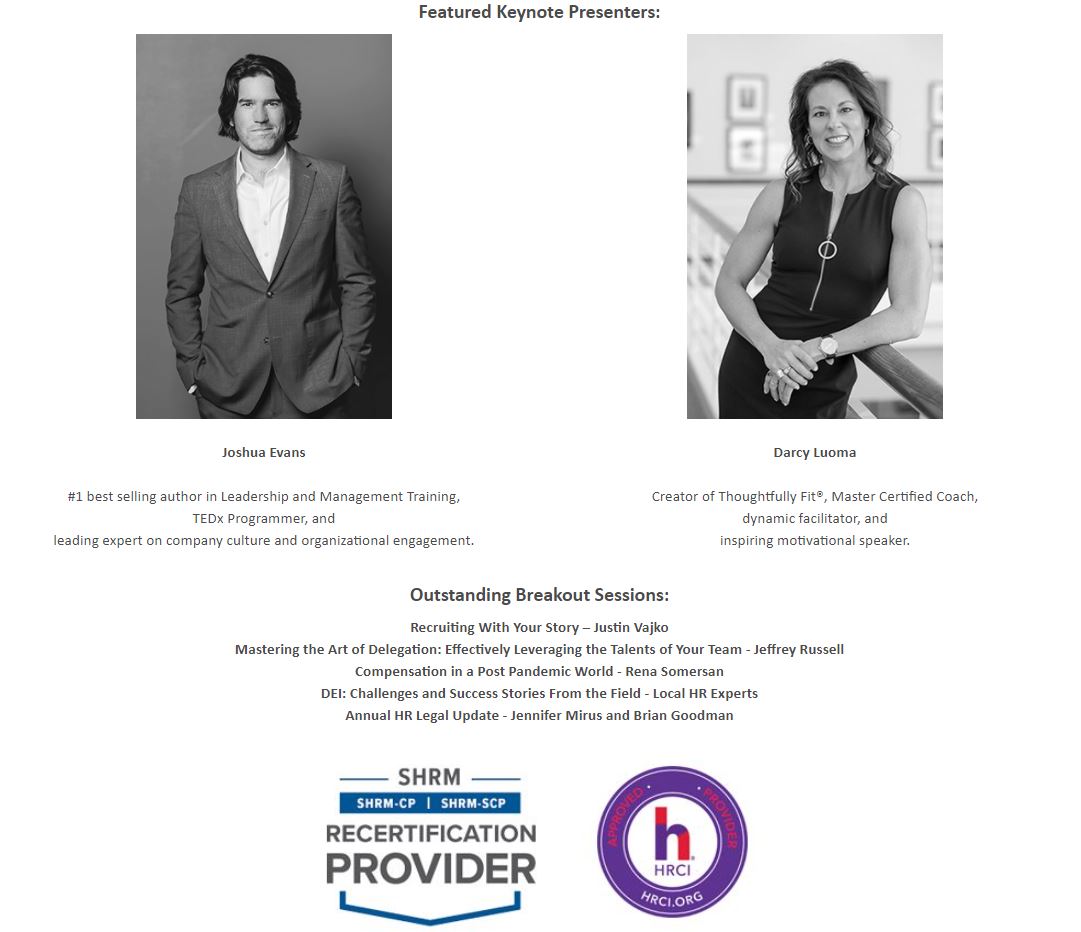February
|
HR InTouchThe Monthly Newsletter of the Greater Madison Area SHRM |
||||||||||||||||||||||||||||||||||
In This EditionPresident's Message COVID-19 Resources Information for Madison Area HR Professionals Government Affairs & Legal Updates When Wage and Hour Violations Become Class Actions Compensation & Benefits Baby Boomers Are Retiring Early. Are You Prepared for Their Medicare Questions? Professional Development February 10, 2022 WISHRM Day on the Hill February 17th - Meet, Greet, & Eat March 15, 2022 Professional Development Summit - Virtual Focus on Diversity, Equity, and Inclusion May 17th Human Capital Conference Preview! Roundtables Return Virtual to Start 2022! Workforce Readiness, Diversity & Inclusion Diversity Observances in February Monthly Wisconsin Department of Workforce Development - Helpful Links
Welcome New Members!
|
Greetings, GMA SHRM Members! Click here to view the full GMA SHRM Board of Directors
|
||||||||||||||||||||||||||||||||||
%20(A2904780x9DEB4)_135x169.JPG) Brian P. Goodman |
 Sarah J. Horner  Storm Larson |
A case currently pending in the U.S. District Court for the Middle District of Florida spotlights how noncompliance with wage and hour laws risks more than just disgruntled employees. In Ayala et al. v. Nissan N. America, Inc., automobile service technicians brought a class action lawsuit against Nissan for violations of, among other things, the Fair Labor Standards Act (“FLSA”). The lawsuit alleges that the employees were compensated under an unlawful “flat-rate” compensation program rather than at their regular hourly rate for all hours worked, and were not properly paid for overtime on all hours worked in excess of 40 hours in a workweek.
Individual dealerships, like other franchisees, are usually the ones at risk of liability for wage and hour violations from their employees. But in this case, the local franchisee employees brought allegations against Nissan, the franchisor. The plaintiffs sued under a theory called “joint employer” liability, which is becoming a popular tactic in FLSA litigation.
The “joint employer” theory is permissible under the FLSA because that statute defines “employer” as “any person acting directly or indirectly in the interest of an employer in relation to an employee.” Accordingly, a court may conclude that a joint employment relationship exists if the franchisees are economically dependent upon the franchisor. In Ayala et al., for example, the court concluded that it was possible for Nissan to be held liable as a joint employer because the class alleged that Nissan itself established the compensation systems at each dealership and significantly controlled the decision-making process of the dealerships.
The takeaway here is that when compensation practices are consistently incorrect across an organization, the employer—whether that be the franchisee individually or with a franchisor jointly—could be facing a class of employees rather than just one. Each wage and hour mishap could seem small at first, but in the aggregate, the costs could become steep.
Return to Top
Greater Madison Area SHRM and Gallagher Surveys are pleased to present the annual salary survey.
Local compensation data is hard to find and the GMA SHRM Compensation survey is a great resource! This year thirty-three organizations participated in the 2021 version of the survey.
Visit the GMA SHRM Compensation Survey page to view:
- a list of participating organizations
- a sample of the survey data
- purchasing information
More Information
Return to Top
Submitted by GMA SHRM member Holly Frank Division Manager at Physicians Mutual
 Many of the economy’s “quitters” of the Great Resignation are actually seniors who decided to retire early. According to Pew Research Center, 3.2 million more boomers retired in the third quarter of 2020 compared to 2019. Since then, older workers aged 65 and up have remained out of the labor force. The pandemic is likely a contributing factor to this surge in early retirement, as it poses a much higher risk of illness to the older population.
Many of the economy’s “quitters” of the Great Resignation are actually seniors who decided to retire early. According to Pew Research Center, 3.2 million more boomers retired in the third quarter of 2020 compared to 2019. Since then, older workers aged 65 and up have remained out of the labor force. The pandemic is likely a contributing factor to this surge in early retirement, as it poses a much higher risk of illness to the older population.
Pandemic or not, with more Boomers turning 65 and considering retirement, you’ll want to be prepared for their Medicare questions. In my experience, HR professionals are often just as confused by Medicare as their employees and retirees. It is certainly more complicated than it needs to be and unfortunately, I’ve seen some costly mistakes.
One of the more unique situations involved my friend Heather, a retired nurse. Part of her retirement package included the ability to stay on her employer group health insurance plan as a retiree, at no cost to her until age 70. As she approached her 70th birthday, Heather asked me to help her select insurance to go with Medicare.
We discussed her options and at one point I asked to see her Medicare card. It only showed her Part A enrollment date. Nothing was listed for Part B! When I asked her about this, she told me that she didn’t need Part B, because she was able to stay on her employer group insurance. I explained to her that as a retiree eligible for Medicare, she needed to be enrolled in both Medicare Part A and Part B. Heather insisted that when she retired, she was told by HR, the group plan administrator, AND the lady at the local social security office, that she did NOT need Part B. I have to believe there was some miscommunication involved. Maybe they thought she planned to continue working?
Heather was probably starting to wonder if I really knew what I was talking about! I started thinking about when the next General Enrollment Period was and I began calculating the late penalties in my head, but I didn’t share any of this with her just yet. Instead, I asked her if she had the phone number to the HR department at her former place of employment, so we could discuss the situation with them.
The HR professional we spoke with confirmed that, yes, Heather was supposed to be enrolled in Part B. Heather hadn’t used any medical services, so she hadn’t seen a bill. I told her to ask, “What would happen if I did need medical services?” The answer was: the retiree plan would pay the other 20% of Medicare approved amounts, “as though” she had Medicare. So, Heather would be responsible for the first 80%, along with the amounts over and above the Medicare-approved amounts. Yikes!
The next step was to contact social security and see what her options were. We were told that since Heather was misinformed, social security would be willing to back-date her Medicare Part B to the date she became a Medicare-eligible retiree. However, she would need to produce five years of Medicare premiums. The other option was to enroll during the General Enrollment Period, between January 1st and March 31st (which was just around the corner), for a July 1st start date. If she elected that option, she would pay 50% more for her Part B premium, since the late penalty is 10% for every year (5 years X 10%) of going without it after becoming eligible. Heather decided to pay the late penalty and cross her fingers that she wouldn’t need any major medical services before July 1st.
Things worked out okay for Heather. She didn’t need medical services during the time she was without Medicare, and although she’ll be paying a late penalty for her Part B premium forever, things could have been much worse.
Below is a list you can have handy for when your employees or retirees age 65 or older have Medicare questions:
- You become eligible for Medicare the first of the month you turn 65, or sooner if you qualify due to disability.
- If you/your spouse are currently working AND you receive your health insurance through an employer with 20 or more employees, you are NOT required to enroll in Medicare at age 65.
- When you/your spouse retire, you will have a special opportunity to enroll in Medicare without penalty.
- You have 8 months after you retire to enroll in Part B if you are eligible.
- Your employer needs to sign a Request for Employment Information form for you to submit to social security, along with your Part B application.
- Leaving COBRA insurance does not qualify as a Special Enrollment Period.
- You should stop contributing to an HSA account six months prior to enrolling in Medicare Part A.
- If you are aged 65 and up and elect to stay on employer group insurance as a retiree (if the option exists), you must enroll in BOTH Medicare Part A AND Part B or risk late penalties and missed enrollment periods.
- Retiree insurance works with and is secondary to Medicare. Medicare pays first.
Retiring is complicated enough without the stress and confusion that Medicare often adds. You can be a hero to your employees and retirees when you know the answers to their Medicare questions. You can help them avoid costly mistakes and instead help them achieve peace of mind during retirement.
Join your SHRM colleagues from around the state at our 8th Annual WI SHRM Day on the Hill event on Thursday, February 10, 2022! Our Day on the Hill event will provide you with a day of education, legal updates, advocacy, and networking opportunities with your HR colleagues and legislators. The event includes legal updates from our WI SHRM Legal Partner, Boardman Clark, LLP, and other Wisconsin area professionals who are also well-versed on a National level as well, and a presentation regarding the Accommodate in Place Initiative.
To register go to: https://wishrm.org/2022-Day-on-the-Hill
Meet, Greet & Eat with your fellow GMA SHRM Members!
Share stories, interests and have some laughs over coffee or lunch! A great way to connect, gripe and celebrate with your HR peeps that "get it"!
This edition of Meet, Greet, and Eat will be held on zoom from 12:00 to 1:00pm!
Click here to join or for more information!
 March 15, 2022 Professional Development Summit
March 15, 2022 Professional Development Summit
A Virtual Event
Focus on Diversity, Equity, and Inclusion
| Session 1: TEAM - Together Everyone Achieves More Dr. Robert Lemon |
Session 2: Mental Health in the Workplace & Introduction of “The Accommodate in Place Initiative” Matt Glowacki |
_183x275.jpg) |
 |
May 17th Human Capital Conference Preview!
Registration Open Soon!
Roundtables Return Virtual to Start 2022!
HR Advice Network Roundtables are informal, peer-led discussions facilitated under the auspices of the GMA SHRM Programming Committee. The focus of the roundtables are to support GMA SHRM members who are either HR professionals or individuals who may have HR responsibilities within their organizations. Members come together to address and discuss their emerging HR challenges, in an open forum format, by sharing information, seeking advice, providing support and tangible resources to one another by exploring best practices.
These Roundtables are designed for those professionals who are interested in sharing their ideas and experiences in a confidential environment. It is expected what members share in these roundtables will stay within the roundtable. We encourage members to exchange business cards and reach out to each other outside of these meetings to expand on the discussions.
A special thank you to our Rountable facilitators Dawn Koopman, Tracy Niesen Breunig, and Melissa Chadwick!
More information.
Return to Top
Diversity Observances in February
Submitted by Mary Vesely, Employee Engagement & Inclusion Manager at Fairway Independent Mortgage Corporation and GMA SHRM Director of Diversity
 Why not have fun, celebrate diversity, learn about each other, and use these observances as themes to engage your team!
Why not have fun, celebrate diversity, learn about each other, and use these observances as themes to engage your team!
- Black History Month
- Chinese New Year/ Lunar New Year: Feb 1
Check out our DEI Resources Page for helpful resources! Stay tuned for semi-annual updates on our downloadable document. We welcome any ideas/suggestions.
Return to Top
Monthly Wisconsin Department of Workforce Development - Helpful Links
Hours and Times of Day Minors May Work in Wisconsin
https://dwd.wisconsin.gov/dwd/publications/erd/pdf/erd-9212-p.pdf
Wisconsin DEPARTMENT OF WORKFORCE DEVELOPMENT -https://dwd.wisconsin.gov/er/
Welcome New Members!
| Nancy | Andrews | SHRM-CP | HR Manager | University of Wisconsin-Madison |
| Lauren | Levey | Human Resource Coordinator | Alsum Farms & Produce | |
| Keegan | Moldenhauer | Founder | Internship on Demand | |
| Tina | Rennhack | HR Assistant | EVCO Plastics | |
| Parker | Talbot | Sales Operations | The Alliance |
Have you recently earned a professional achievement award? If so, we want to hear about it.
If so, we want to hear about it. Send us an e-mail, and we’ll publish your good news in the next HR InTouch!
If you are a member who is in between jobs, or who is currently employed but seeking new positions or career paths, write us a brief description of your skill set, areas of expertise, what you’re looking for, etc. Send us an e-mail. We’ll publish your information in the next HR InTouch.





